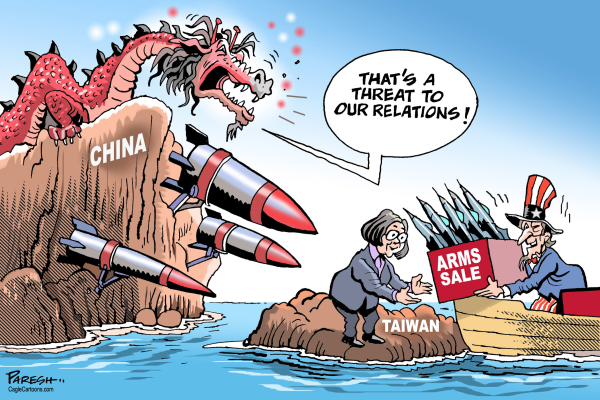
The 56 Chinese flights on Monday brought the total for October to 149, already the year's highest monthly total.
The flights have been steadily increasing in recent years, as Beijing harries Taiwan and demonstrates its discontent with the island nation's closer relationship to the United States. The Chinese may also want to wear down the Taiwanese by forcing them to constantly respond.
Regardless, the flights underscore why Taiwan is the most dangerous and potentially most consequential flashpoint on Earth.
If China can successfully absorb Taiwan while limiting the military, economic, and diplomatic costs, it would vindicate President Xi's vision of an ascendant China undoing past humiliations, represent a milestone in China's campaign to establish hegemony in the most important region of the world, and, perhaps, collapse the credibility and global position of the United States.
On the other hand, a debacle in Taiwan could have devastating economic and diplomatic consequences for China, threatening Xi's rule.
In other words, attention must be paid -- the trajectory of the modern world is conceivably at stake.
The Trump administration began to reorient the U.S. defense posture toward this threat, and the Biden administration has followed up, most importantly, with the nuclear submarine deal with Australia.
It's been completely obvious for a long time that China has been preparing, if it so chooses, to take Taiwan by force of arms, and keep us from being able to do anything about it.
It has massively increased its force of ballistic missiles, better to target a wide array of ships and hold at risk U.S. ground units. Prior to the latest, more serious iteration of the missile threat, Tom Shugart of the Center for New American Security estimated that a preemptive Chinese strike on our bases in the region "could crater every runway and runway-length taxiway at every major U.S. base in Japan, and destroy more than 200 aircraft on the ground."
China has been churning out long-range strike aircraft and engaged in a historic naval buildup. It now has the largest navy in the world.
Nonetheless, invading and occupying Taiwan after launching a gigantic, logistically taxing amphibious operation across a 110-mile strait would be no small feat, to put it mildly.
It should be our objective to keep China at bay, toward the goal of keeping it from establishing its dominance over Asia, as former Trump defense official Elbridge Colby argues in his compelling new book "The Strategy of Denial."
But the Taiwanese haven't exhibited the urgency one would expect of an island of 24 million people coveted by a nearby nation of 1.4 billion people that makes no secret of its compulsion to try to swallow it whole.
Until a few years ago, Taiwan's defense budget was shockingly inadequate. Its military reserves are lackluster. Its frontline units tend not to operate at full strength. It has often been seduced by the allure of so-called prestige weapons, such as top-end fighter aircraft that are irrelevant to its predicament.
We should be fortifying Taiwan and making it as difficult as possible for China to take. That means stockpiling food, energy and munitions against a Chinese blockade. It means making its infrastructure more resilient and enhancing its cyber capabilities. It means increasing its capability to detect an early mustering of Chinese forces. It means more mines, anti-ship missiles, air-defense capabilities and unmanned systems to frustrate a cross-strait invasion.
The Chinese have been focused on "area denial," missiles and the like to deny our access to Taiwan and its environs. But these capabilities can be turned against China, too.
If we are ever inclined to forget about how pressing the threat is, not to worry, the Chinese will have more flights or other provocations to remind us.
(COMMENT, BELOW)


 Contact The Editor
Contact The Editor
 Articles By This Author
Articles By This Author